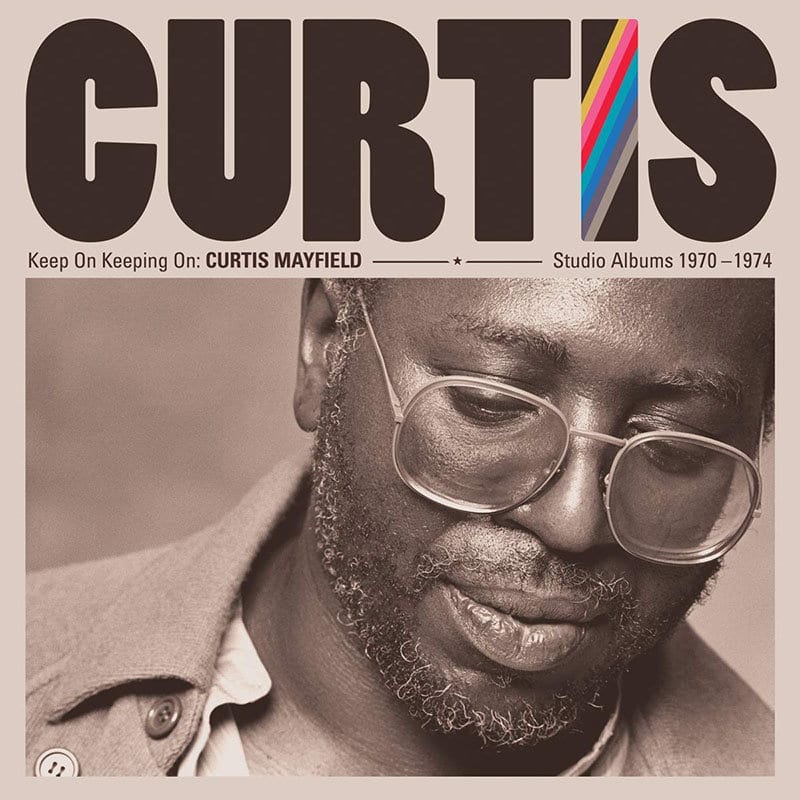
With the near collapse of HMV in the UK (it’s holding on, but the flagship Oxford Street branch is shuttered, although its shopfront logo is still lit up as if in mourning), physical product seems more under siege than ever. And yet if there were any way to experience this boxed Curtis Mayfield collection from Rhino, it would have to be vinyl, followed by CD, with downloads and streaming only as either final resorts or as a means of getting a foretaste of the music while waiting for the real thing to arrive in the mail. The vinyl, in particular, has much to recommend it, having been handled by the inestimable Chris Bellman, the man responsible for several Joni Mitchell Rhino reissues that were either better or as good as the first American pressings.
Sometimes with vinyl, it’s a case of buyer beware. An example would be Rhino’s reissues of Joni Mitchell’s Court and Spark and their recent blue-vinyl reissue of Blue. In the US, these are packaged in exact replicas of the original, right down to the precise texture and weight of the stock, and the vinyl has been cut by people of the caliber of Kevin Gray. In Europe, however, cheaper, thinner paper is used, bearing little relation to the originals and there is no indication at all of the source used for the music nor the identity of the cutter.
I’m relieved to say that with the Curtis Mayfield box, both Europe and the US get the same quality. It’s a shame that at a time when Rhino is making some of the very best vinyl by a non-audiophile label (check out their 2017 issue of T. Rex’s Electric Warrior if you want to hear that classic album sounding the best it ever has), there is sometimes a terrible disparity between the American and European versions and, even worse, it’s a disparity not made plain on the various Rhino/Warner websites, so the buyer remains blissfully un-apprised until it’s too late. It’s a bit much when you’re asking people to cough up more than £20.
Few catalogues are as in need of a quality-controlled overhaul as Curtis Mayfield’s. The proliferation of indifferently-presented reissues, especially in Europe, some mastered from vinyl, and some from completely unknown sources has clogged up the market. Many of them look like they haven’t been legitimately licensed. Fortunately, although no source is specified, this Rhino/Warners package is, by a long mile, the best way to hear Mayfield’s first four albums (Super Fly counts as a soundtrack and has already been reissued by Rhino and, more recently, Mobile Fidelity), unless your pocket stretches to good quality Curtom originals.
The vinyl has been cut by the afore-mentioned Chris Bellman, a dependable name responsible for some of the best modern vinyl on the market. The set has been simultaneously released to CD, download, and streaming platforms. Compared to the recent Chic box (also from Rhino), this has fewer frills; there’s no booklet and no newly-commissioned essays. All you’re getting, in addition to the four albums, is a cardboard box, attractive though it is. It remains to be seen whether or not the four albums will be issued separately, without the box.
Curtis (1970) was notable for the blinding, canary-yellow two-piece sported by Mayfield on the front. The music was just as striking. His first solo album after years with The Impressions presented eight lengthy, politically conscious, progressive soul songs, some easy to connect with, others more challenging and requiring multiple listens. “The Makings of You” in particular meanders in a conversational manner, like the recitative sections in opera. “The Other Side of Town” and “We the People Who Are Darker Than Blue” examine different aspects of the struggle for racial equality and justice. Although it’s remained a staple of Mayfield’s catalog for decades, regarded as nearly equal or even superior to the Super Fly soundtrack, at the time of its release the album was panned by Rolling Stone, who dismissed its songwriting as “disjointed skeletons”.
This seems unfair when you consider the album’s two singles, “Move on Up” and “(Don’t Worry) If There Is a Hell Below We’re All Gonna Go”, both of which have pronounced commercial clout, the former benefitting not only from a catchy vocal refrain, but also a fabulous horns-and-congas arrangement, with an instantly memorable motif. In edited form (the album version runs for nearly nine minutes), it became a UK Top 20 hit (and US R&B #3). Other critics who were initially unimpressed, including perennial New York cynic, Robert Christgau, have since reconsidered their damning verdicts of this gold-seller and today Curtis frequently features in ‘Best Album’ listicles. The version in this collection is now the second-best way of hearing it (the first would be an original US copy).
Roots (1971), which was preceded by a successful live album not included in this package, opens with a kind of “Move on Up mk2”, “Get Down”, slightly more sexual in tone (note the yelps, panting and hollering in the background), with another catchy horn motif. The themes and ideas in Mayfield’s second album are similar to those of its predecessor, and one of the arrangers from Curtis, Riley Hampton, is retained, working alongside the brilliant Johnny Pate. The track that gives this box its name, “Keep on Keeping On”, could easily have come from the previous album. Roots was another Top 40 success. Ecological, as well as racial issues, informed the writing, with “Underground” hypothesizing a dismal future in which humanity has had to burrow beneath the planet’s surface to escape pollution, with the unforeseen consequence that racial differences are no longer visible.
The singles, including the ultra-catchy, “We Got to Have Peace”, were only modest successes this time and, like clockwork, another Rolling Stone pan was published in early 1972, (the magazine sheepishly reconsidered its position 24 years later). “Beautiful Brother of Mine”, with its soaring harmonies (uncredited, alas) and its glorious “we’ve got love” refrain, is, at nearly eight minutes, the album’s centerpiece, a tremendous creative achievement. It works so well that the clunkiness of the lyrics (“At last we’ve outgrown Uncle Tom / Devoting more time in the slum / Teaching our own a new pride / That makes us feel all good inside”) slips by nearly unnoticed. The moody, “Now You’re Gone” is, of all the tracks, the one least like anything else on the album. In 6/8 time, it cycles through just three chords, its elaborate arrangement disguising the simplicity. The overall effect is oddly hypnotic. This reissue recreates the elaborate original multi-fold packaging, complete with dropdown 1971/1972 calendar.
Back to the World (1973) arrived with a rainbow-hued gatefold (credited to Glen Christensen, Gary Wolkowitz and Milton Sincoff), its cover collage making clear that a state-of-the-nation polemic was housed within. The Super Fly experience of the previous year seemed to have sharpened Mayfield’s ability to pen perceptive social commentary, albeit with rhymes that were sometimes rather forced. The title track explores the circumstances of a black war veteran attempting to readjust to civilian life, immediately confronted by its multiple injustices. “Future Shock”, the album’s biggest hit, brings back the rhythm pattern of “Pusherman” (from Super Fly), marrying it to a libretto about pollution, inequality, and poverty.
“Right on for the Darkness’ completes Side One, its oblique, apocalyptic poetry enhanced by one of Richard Tufo’s best arrangements. On the second side, the despairing tone yields to something much more cheerful, starting with “If I Were Only a Child Again”. It’s a tempered jubilation, depicting childhood as a fleeting prelude to the war, violence, and disillusionment of adulthood. The final few songs are slighter but more uplifting. Back to the World landed Mayfield comfortably within the US Top 20, going gold; just a shame its sleeve bore no musician credits.
Sweet Exorcist (1974) suggested a running out of steam; hardly surprising given the album-a-year treadmill, unthinkable in today’s recording industry, that was standard practice at the time. The album’s uncredited arrangers were Richard Tufo and Gil Askey (the contributing musicians were also un-identified on the sleeve). The doom-laden, graphic-novel cover-art depicted Greek gods holding planets amid a sea of human skeletons and the songs, once more, dealt with romantic entanglements, world disaster, and social injustice.
It’s the final two tracks of Sweet Exorcist, the ballad, “Suffer” (written in 1969 with Donny Hathaway), and mid-tempo groover, “Make Me Believe in You”, that lift the album from monotony. Mayfield takes a break from saving the world to make room for some poignant observations about adult relationships. Both songs are as fine as anything else in Mayfield’s Curtom catalog, with the latter benefitting from one of Mayfield’s and Tufo’s best arrangements, full of lovely, pre-disco flourishes (those pizzicato strings, that scratchy guitar!), the equal of anything on Super Fly. No surprise that “Make Me Believe in You” was selected by Paul Weller as one of Mayfield’s five finest productions in a 2017 Rolling Stone piece. Sweet Exorcist was Mayfield’s final Top 40 album (#2 on the R&B listings).
This is the best presentation, both visually and aurally, that these four albums have had since their original print-run. Although it’s been issued to streaming, the fitting way to appreciate Keep on Keeping On is surely to go with physical. Mayfield’s achievements are even more appreciable when you consider that during this fantastic run of albums, he also found the time to write and produce for other people, including Baby Huey, whose sole album, the posthumous Baby Huey Story: The Living Legend (Curtom, 1971), is getting a high-quality vinyl reissue of its own on Warners’ Run Out Groove specialist label in May. It’s an ideal companion piece to this release.

